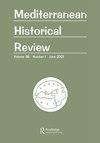New horizons: Mediterranean research in the 21st century
IF 0.2
2区 历史学
Q1 HISTORY
引用次数: 0
Abstract
perspectives. Furthermore, The Inland Seas covers a broad chronological span; thus, readers are accompanied along a diachronic route, becoming witnesses of the changes that have occurred in the perception (and subsequent exploitation) of the sea. The chronological arrangement of the contributions allows readers to detect clearly how the sea – due to its status as a freely usable resource – gradually suffered from overexploitation, which ultimately made it necessary to regulate and limit access to it. We are still living with and learning how to deal with the consequences of this process, and this is why eco-history in general, and this book in particular, is currently so relevant.新视野:21世纪的地中海研究
本文章由计算机程序翻译,如有差异,请以英文原文为准。
求助全文
约1分钟内获得全文
求助全文

 求助内容:
求助内容: 应助结果提醒方式:
应助结果提醒方式:


